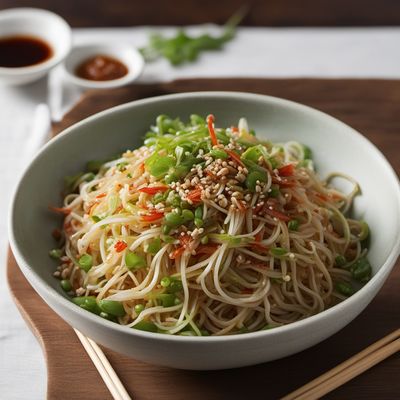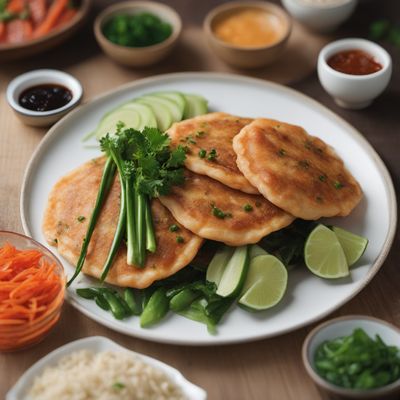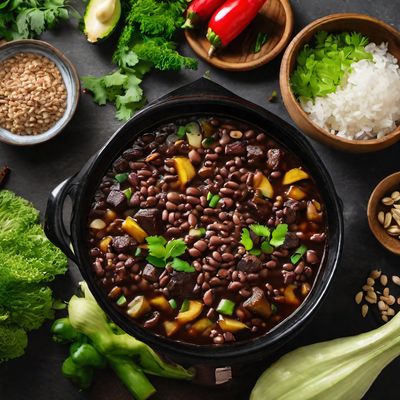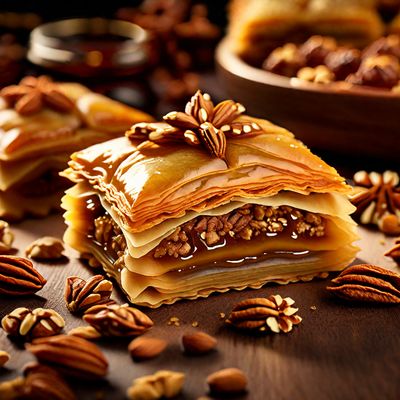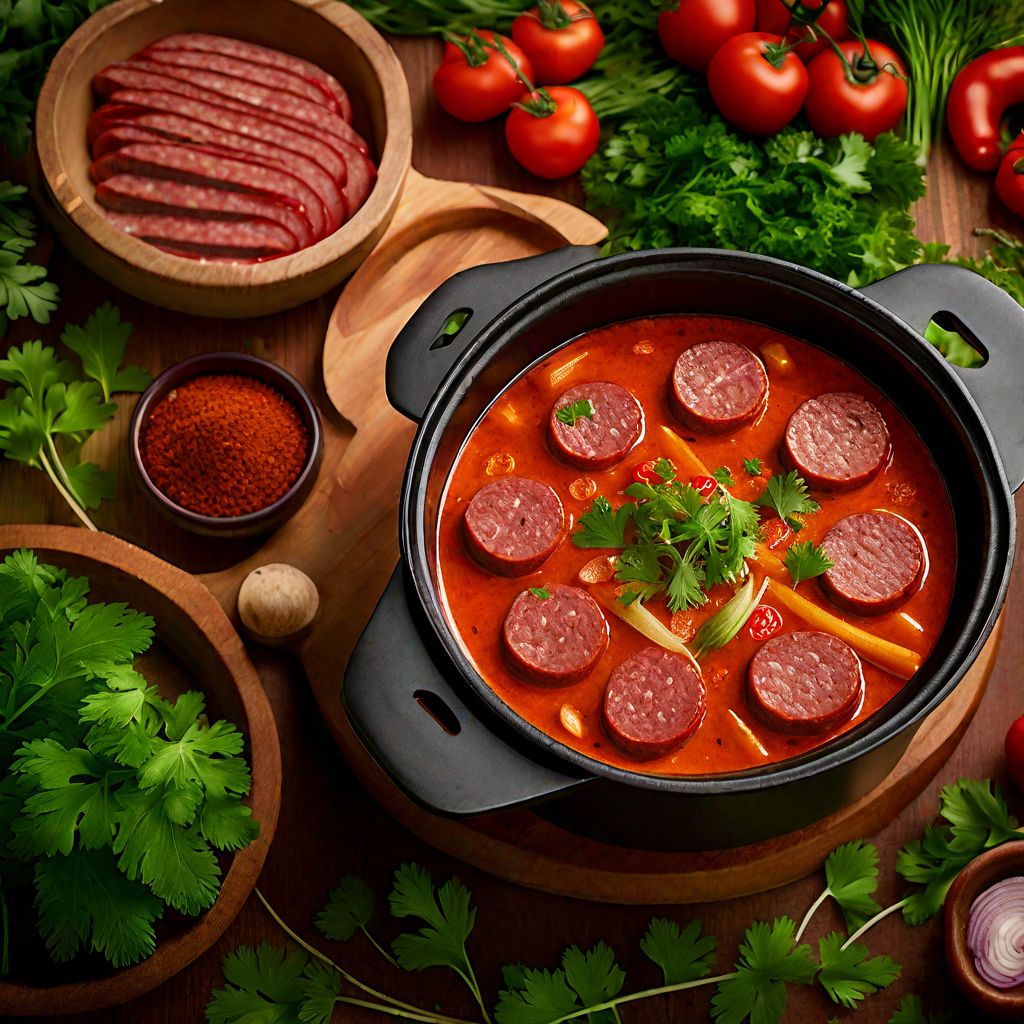
Recipe
Bavarian Budae Jjigae
Sausage and Sauerkraut Stew with a Korean Twist
4.8 out of 5
In the context of Bavarian cuisine, this recipe brings a unique twist to the traditional sausage and sauerkraut stew by infusing it with Korean flavors. Bavarian Budae Jjigae combines the hearty elements of Bavarian cuisine with the spicy and savory notes of Korean cuisine, resulting in a comforting and flavorful dish.
Metadata
Preparation time
15 minutes
Cooking time
30 minutes
Total time
45 minutes
Yields
4 servings
Preparation difficulty
Easy
Suitable for
Omnivore, Low-carb, High-protein, Dairy-free, Gluten-free (if using gluten-free sausages)
Allergens
Mustard, Garlic
Not suitable for
Vegetarian, Vegan, Pescatarian, Kosher, Halal
Ingredients
While the original Korean Budae Jjigae typically includes ingredients like kimchi, ramen noodles, and gochujang, this Bavarian adaptation replaces those with Bavarian sausages, sauerkraut, and German mustard. The fusion of Korean and Bavarian flavors creates a delightful blend of tastes that is both familiar and exciting. We alse have the original recipe for Budae jjigae, so you can check it out.
-
4 Bavarian sausages, sliced (400g) 4 Bavarian sausages, sliced (400g)
-
2 cups (470ml) sauerkraut 2 cups (470ml) sauerkraut
-
1 onion, thinly sliced 1 onion, thinly sliced
-
2 cloves of garlic, minced 2 cloves of garlic, minced
-
1 tablespoon vegetable oil 1 tablespoon vegetable oil
-
1 tablespoon German mustard 1 tablespoon German mustard
-
1 tablespoon tomato paste 1 tablespoon tomato paste
-
1 teaspoon paprika 1 teaspoon paprika
-
1 teaspoon caraway seeds 1 teaspoon caraway seeds
-
4 cups (950ml) beef broth 4 cups (950ml) beef broth
-
Salt and pepper to taste Salt and pepper to taste
-
Chopped fresh parsley for garnish Chopped fresh parsley for garnish
Nutrition
- Calories (kcal / KJ): 350 kcal / 1465 KJ
- Fat (total, saturated): 25g, 8g
- Carbohydrates (total, sugars): 10g, 5g
- Protein: 20g
- Fiber: 3g
- Salt: 2g
Preparation
-
1.Heat the vegetable oil in a large pot over medium heat.
-
2.Add the sliced sausages and cook until browned. Remove from the pot and set aside.
-
3.In the same pot, add the sliced onion and minced garlic. Sauté until the onion becomes translucent.
-
4.Stir in the tomato paste, German mustard, paprika, and caraway seeds. Cook for another minute.
-
5.Add the sauerkraut and beef broth to the pot. Bring to a boil, then reduce the heat and simmer for 15 minutes.
-
6.Return the cooked sausages to the pot and simmer for an additional 10 minutes.
-
7.Season with salt and pepper to taste.
-
8.Serve the Bavarian Budae Jjigae hot, garnished with chopped fresh parsley.
Treat your ingredients with care...
- Bavarian sausages — Choose a variety of sausages such as bratwurst, weisswurst, or bockwurst for authentic Bavarian flavors.
- Sauerkraut — Rinse the sauerkraut under cold water before using to reduce its sourness if desired.
- German mustard — Use a spicy or whole grain mustard to add a tangy kick to the stew.
Tips & Tricks
- For a spicier version, add a pinch of cayenne pepper or chili flakes.
- Serve the stew with crusty bread or pretzels to soak up the flavorful broth.
- Feel free to add other Bavarian ingredients like potatoes or cabbage for extra heartiness.
- Adjust the seasoning according to your taste preferences.
- Leftovers can be refrigerated and reheated the next day for an even more flavorful meal.
Serving advice
Serve the Bavarian Budae Jjigae in deep bowls, allowing the sausages, sauerkraut, and broth to be enjoyed together. Provide spoons for savoring every delicious bite.
Presentation advice
Garnish the stew with a sprinkle of chopped fresh parsley to add a pop of color and freshness. Serve it alongside a slice of Bavarian bread or a pretzel for an authentic touch.
More recipes...
For Budae jjigae » Browse all
For Korean cuisine » Browse all
More Korean cuisine dishes » Browse all
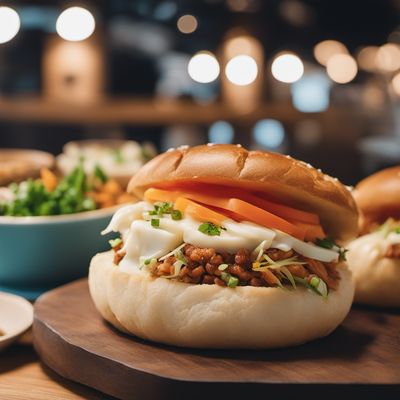
Bap
Bap is a traditional Korean bread that is perfect for any meal. It is a soft and fluffy bread that is often filled with meat or vegetables. This...

Janchi guksu
Banquet Noodles
Janchi guksu is a Korean noodle dish made with thin wheat noodles in a clear broth.
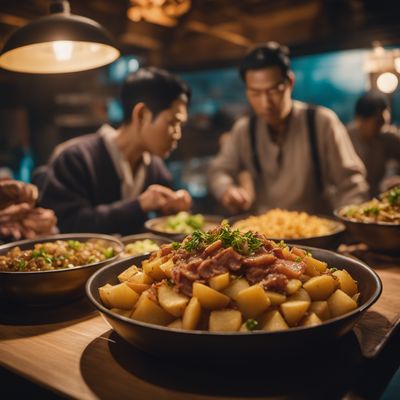
Gamja-haem-bokkeum
Stir-fried potatoes and ham
Gamja-haem-bokkeum is a Korean dish that is made with stir-fried potatoes and ham. It is a popular side dish that is easy to make and is perfect...





